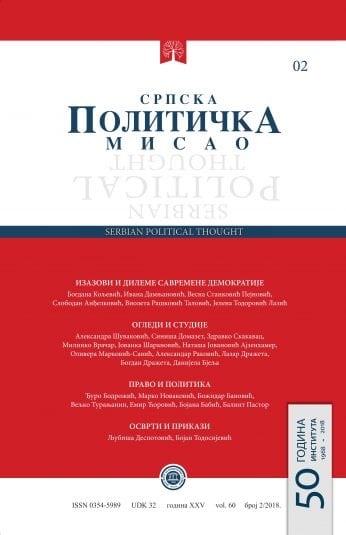Утицај спољне политике Руске федерације на измену безбедносног амбијента у европи на почетку 21. века
Impact of Foreign Policy of the Russian Federation on European Security at the Beginning of the 21st Century
Author(s): Zoran Mirković, Miljan FilimonovićSubject(s): Security and defense, EU-Accession / EU-DEvelopment, Geopolitics
Published by: Институт за политичке студије
Keywords: Russian Federation; Medvedev’s initiative; order; security; Europe; USA; Vladimir Putin
Summary/Abstract: Authors argue that in period between 2008 and 2010 there was an opportunity to create a stable European security and political order based on consensus of the key political actors that could have resulted in strengthening of the UN and OSCE role in European political affairs. Interests of the key actors all went down to the same direction, pointing that there is a need for stability and negotiations about political future of the European continent. The opportunity was recognised by former Russian president Dmitry Medvedev who proposed organizing the conference on establishing a “new European security architecture”. After rejection of the Russian proposal by the USA, Moscow started implementing its own strategy of establishing new political order in Europe with the single goal of promoting its own interests. Being rejected by the West, Russia considered itself no longer moraly obligated by the needs and interests of the other actors of European politics. Anti-Russian campaign in the West contributed to the sentiment of frustration in Russia. The same was with economic sanctions that were introduced in later period. One of the consequences of the Moscow’s new foreign policy approach was a number of breaches of international law as well as a number of provocations towards western countries. Authors argue that Kremlin would never have taken actions like this, if it had not been repeatedly rejected by the West in practicaly all of its initiatives. As a result of renewed Moscow−Washington tensions, Europe has become less stable and the trend is towards further escalation. With revisionist Russia, as a strogest military power in Europe, largest and most populated country, smaller states have a lot more complicated international environment to understand and adapt to. Environment has been extremely polarized. The balance has shifted from earlier hegemonic stability in Europe to unstable balance of power combined with “proxy” wars of Cold War superpowers in Ukraine and Siria. Situation like this is in accordance with Russia’s interests in a way that it proves West’s inability to govern international processes and solve big international problems. Authors conclude that Russia has regained its former great power status on its own, and stands as one of three key international actors in European politics, next to USA and EU. Again, as in 2008, there is the need for consensus, but this time Russia will be much less ready to make compromises with its’ own national interests.
Journal: Српска политичка мисао
- Issue Year: 2018
- Issue No: 3
- Page Range: 211-218
- Page Count: 18
- Language: Serbian

